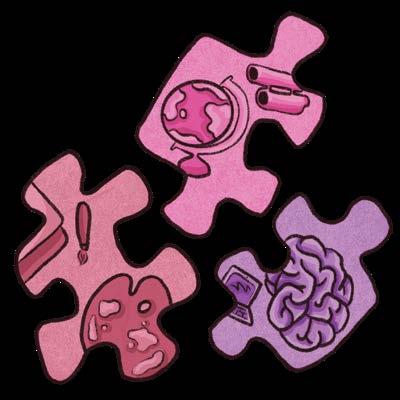
3 minute read
THE LIBERAL ARTS STILL MATTER
Education for its own sake is more valuable than you thought
Carmel Dear - Writer Freya Emery - Illustrator
Advertisement
‘What kind of bozo would study the liberal arts nowadays?’
There’s a certain taboo about interdisciplinary programs. When somebody decides not to specialize, many people interpret it as settling after not being accepted into your first program or being clueless about your educational goals. From both “pro-everyone-going-to-university” and “the-market-is-oversaturated-with-degrees” sides of the spectrum, you’ll probably be questioned on why you chose to study something that’s seemingly non-essential.

It’s understandable — the cost of living is going up every year, and it’s becoming difficult for anyone to out-earn their expenses (especially in Vancouver). Compared to a specialized degree, any sort of interdisciplinary program seems like a one-way ticket into student debt and living in your mouldy third-hand Honda while working at Tim Hortons. Sometimes it is, especially with a lack of opportunities to break into the job market.
I spent my first year of post-secondary studying the liberal arts. Although I ultimately decided to transfer into a more “practical” program at Capilano to develop specific skills for my goal of preparing for future employment, taking an interdisciplinary program for a year was one of the best decisions I could have made for my education. My academic improvement was noticeable.
I was pushed to improve my writing through humanities papers, develop logical thinking in philosophy courses, think in a different way by taking a new language, and develop cultural awareness through works of literature and art history.
I learned how to approach university education from a classical perspective, giving me a structure to think and analyze concepts with the context of the history of education behind me. (After all, education was built over thousands of years by thinkers greater than you or I.)
If it weren’t for the liberal arts, we wouldn’t have universities. The earliest formal educational institutions didn’t have engineering programs, but they did teach what they called “grammar, logic, and rhetoric.” Students were trained in the foundational principles of multiple subjects, how to think coherently and consistently, and how to convey truth discovered by diligent study to others in an ethical and persuasive manner.
The liberal arts are important to building strong members of society who each think and create in a unique way. Not only do the liberal arts create culture by encouraging people to investigate problems, write, and contribute to the treasury of knowledge we have as human beings, but they encourage people to come to conclusions on their own. The method of education borrows from the ancient “Socratic method” of learning, which emphasizes questioning to come to a truth and developing critical thinking skills over pure memorization.
Not that memorization is always a bad thing, and it’s necessary to a certain point, but why should education end at that? Many of the most brilliant philosophers and scientists had students who were dissatisfied with the findings of their teachers, and therefore used their skills to conduct new research to improve upon their conclusion. How often does that happen now? Students are expected to memorize definitions and meet the arbitrary expectations of each professor, encouraging educational conformity over unique insights and conclusions.
It’s a shame that we tend not to speak about liberal arts by that name anymore, and tend towards calling it “general studies” or “interdisciplinary studies.” The title “liberal” doesn’t point towards a political or economic bias, but towards the Latin word for “freedom” or “free.” In the ancient Greek and Roman Empires, a culturally relevant education was considered to free citizens from ignorance and understand their world. The knowledge and wisdom gained from a well-rounded education helps someone understand the different aspects of reality and make informed decisions and claims instead of relying on popular culture to define one’s thought.
Not everybody can afford to take a program (or even a year) of education for the sake of itself and to form a stronger society when it doesn’t guarantee a job, but I was fortunate enough to have the option. I’d recommend it to anyone who is able to spend the time and money to improve their academic abilities. It’s unfortunate that such a valuable, holistic approach to education doesn’t pay off without further programs, because it’s an essential investment into building culture. If we stop educating ourselves about the fundamentals of human knowledge, how will we continue to build our culture in anything but ignorance?




